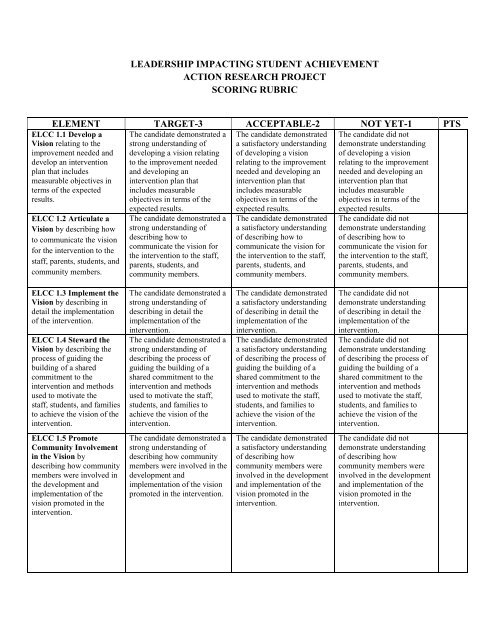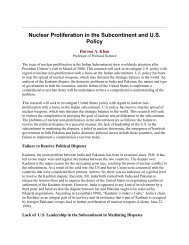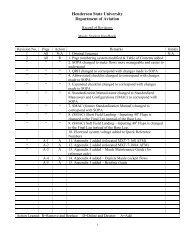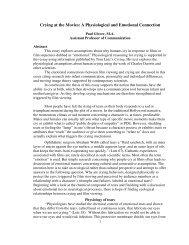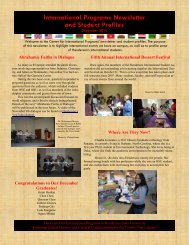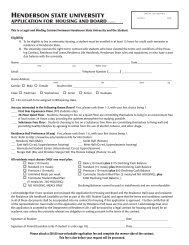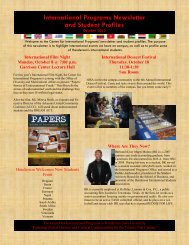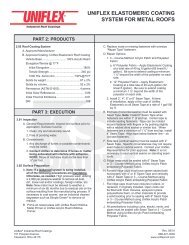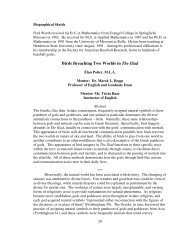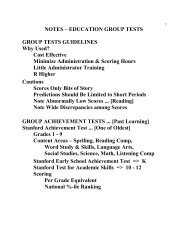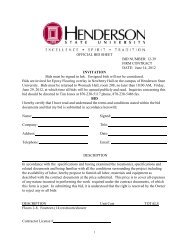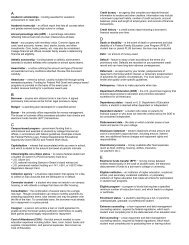Scoring Guide for Action Research Project
Scoring Guide for Action Research Project
Scoring Guide for Action Research Project
You also want an ePaper? Increase the reach of your titles
YUMPU automatically turns print PDFs into web optimized ePapers that Google loves.
LEADERSHIP IMPACTING STUDENT ACHIEVEMENT<br />
ACTION RESEARCH PROJECT<br />
SCORING RUBRIC<br />
ELEMENT TARGET-3 ACCEPTABLE-2 NOT YET-1 PTS<br />
ELCC 1.1 Develop a<br />
Vision relating to the<br />
improvement needed and<br />
develop an intervention<br />
plan that includes<br />
measurable objectives in<br />
terms of the expected<br />
results.<br />
ELCC 1.2 Articulate a<br />
Vision by describing how<br />
to communicate the vision<br />
<strong>for</strong> the intervention to the<br />
staff, parents, students, and<br />
community members.<br />
The candidate demonstrated a<br />
strong understanding of<br />
developing a vision relating<br />
to the improvement needed<br />
and developing an<br />
intervention plan that<br />
includes measurable<br />
objectives in terms of the<br />
expected results.<br />
The candidate demonstrated a<br />
strong understanding of<br />
describing how to<br />
communicate the vision <strong>for</strong><br />
the intervention to the staff,<br />
parents, students, and<br />
community members.<br />
The candidate demonstrated<br />
a satisfactory understanding<br />
of developing a vision<br />
relating to the improvement<br />
needed and developing an<br />
intervention plan that<br />
includes measurable<br />
objectives in terms of the<br />
expected results.<br />
The candidate demonstrated<br />
a satisfactory understanding<br />
of describing how to<br />
communicate the vision <strong>for</strong><br />
the intervention to the staff,<br />
parents, students, and<br />
community members.<br />
The candidate did not<br />
demonstrate understanding<br />
of developing a vision<br />
relating to the improvement<br />
needed and developing an<br />
intervention plan that<br />
includes measurable<br />
objectives in terms of the<br />
expected results.<br />
The candidate did not<br />
demonstrate understanding<br />
of describing how to<br />
communicate the vision <strong>for</strong><br />
the intervention to the staff,<br />
parents, students, and<br />
community members.<br />
ELCC 1.3 Implement the<br />
Vision by describing in<br />
detail the implementation<br />
of the intervention.<br />
ELCC 1.4 Steward the<br />
Vision by describing the<br />
process of guiding the<br />
building of a shared<br />
commitment to the<br />
intervention and methods<br />
used to motivate the<br />
staff, students, and families<br />
to achieve the vision of the<br />
intervention.<br />
The candidate demonstrated a<br />
strong understanding of<br />
describing in detail the<br />
implementation of the<br />
intervention.<br />
The candidate demonstrated a<br />
strong understanding of<br />
describing the process of<br />
guiding the building of a<br />
shared commitment to the<br />
intervention and methods<br />
used to motivate the staff,<br />
students, and families to<br />
achieve the vision of the<br />
intervention.<br />
The candidate demonstrated<br />
a satisfactory understanding<br />
of describing in detail the<br />
implementation of the<br />
intervention.<br />
The candidate demonstrated<br />
a satisfactory understanding<br />
of describing the process of<br />
guiding the building of a<br />
shared commitment to the<br />
intervention and methods<br />
used to motivate the staff,<br />
students, and families to<br />
achieve the vision of the<br />
intervention.<br />
The candidate did not<br />
demonstrate understanding<br />
of describing in detail the<br />
implementation of the<br />
intervention.<br />
The candidate did not<br />
demonstrate understanding<br />
of describing the process of<br />
guiding the building of a<br />
shared commitment to the<br />
intervention and methods<br />
used to motivate the staff,<br />
students, and families to<br />
achieve the vision of the<br />
intervention.<br />
ELCC 1.5 Promote<br />
Community Involvement<br />
in the Vision by<br />
describing how community<br />
members were involved in<br />
the development and<br />
implementation of the<br />
vision promoted in the<br />
intervention.<br />
The candidate demonstrated a<br />
strong understanding of<br />
describing how community<br />
members were involved in the<br />
development and<br />
implementation of the vision<br />
promoted in the intervention.<br />
The candidate demonstrated<br />
a satisfactory understanding<br />
of describing how<br />
community members were<br />
involved in the development<br />
and implementation of the<br />
vision promoted in the<br />
intervention.<br />
The candidate did not<br />
demonstrate understanding<br />
of describing how<br />
community members were<br />
involved in the development<br />
and implementation of the<br />
vision promoted in the<br />
intervention.
ELCC 2.1 Promote<br />
Positive School Culture<br />
by using the results of the<br />
“Results/Conclusion”<br />
section, to explain how the<br />
intervention promoted a<br />
positive school culture of<br />
school improvement to<br />
meet the needs of all<br />
students.<br />
ELCC 2.2 Provide<br />
Effective Instructional<br />
Program by making<br />
recommendations<br />
regarding the design of<br />
practices to improve<br />
student achievement.<br />
ELCC 2.3 Apply Best<br />
Practice to Student<br />
Learning by collecting<br />
data to demonstrate how<br />
the need <strong>for</strong> intervention<br />
<strong>for</strong> the identified<br />
improvement was<br />
determined.<br />
ELCC 2.3 Apply Best<br />
Practice to Student<br />
Learning by reviewing<br />
research literature relative<br />
to the chosen intervention<br />
plan which would be<br />
considered to be a best<br />
practice or possible<br />
solution to improving<br />
student achievement<br />
ELCC 2.4 Professional<br />
Development<br />
Intervention Strategy<br />
outline professional growth<br />
strategies <strong>for</strong> delivery to<br />
the faculty or staff<br />
involved in the<br />
intervention.<br />
The candidate demonstrated a<br />
strong understanding of using<br />
the results of the<br />
“Results/Conclusion” section,<br />
to explain how the<br />
intervention promoted a<br />
positive school culture of<br />
school improvement to meet<br />
the needs of all students.<br />
The candidate demonstrated a<br />
strong understanding of<br />
making recommendations<br />
regarding the design of<br />
practices to improve student<br />
achievement.<br />
The candidate demonstrated a<br />
strong understanding by<br />
collecting data to demonstrate<br />
how the need <strong>for</strong> intervention<br />
<strong>for</strong> the identified<br />
improvement was<br />
determined.<br />
The candidate demonstrated a<br />
strong understanding of<br />
reviewing research literature<br />
relative to the chosen<br />
intervention plan which<br />
would be considered to be a<br />
best practice or possible<br />
solution to improving student<br />
achievement<br />
The candidate demonstrated a<br />
strong understanding of<br />
outlining professional growth<br />
strategies <strong>for</strong> delivery to the<br />
faculty or staff involved in<br />
the intervention.<br />
The candidate demonstrated<br />
a satisfactory understanding<br />
of using the results of the<br />
“Results/Conclusion”<br />
section, to explain how the<br />
intervention promoted a<br />
positive school culture of<br />
school improvement to meet<br />
the needs of all students.<br />
The candidate demonstrated<br />
a satisfactory understanding<br />
of making recommendations<br />
regarding the design of<br />
practices to improve student<br />
achievement.<br />
The candidate demonstrated<br />
a satisfactory understanding<br />
by collecting data to<br />
demonstrate how the need<br />
<strong>for</strong> intervention <strong>for</strong> the<br />
identified improvement was<br />
determined.<br />
The candidate demonstrated<br />
a satisfactory understanding<br />
of reviewing research<br />
literature relative to the<br />
chosen intervention plan<br />
which would be considered<br />
to be a best practice or<br />
possible solution to<br />
improving student<br />
achievement<br />
The candidate demonstrated<br />
a satisfactory understanding<br />
of outlining professional<br />
growth strategies <strong>for</strong><br />
delivery to the faculty or<br />
staff involved in the<br />
intervention.<br />
The candidate did not<br />
demonstrate understanding<br />
of using the results of the<br />
“Results/Conclusion”<br />
section, to explain how the<br />
intervention promoted a<br />
positive school culture of<br />
school improvement to meet<br />
the needs of all students.<br />
The candidate did not<br />
demonstrate understanding<br />
of making recommendations<br />
regarding the design of<br />
practices to improve student<br />
achievement.<br />
The candidate did not<br />
demonstrate understanding<br />
by collecting data to<br />
demonstrate how the need<br />
<strong>for</strong> intervention <strong>for</strong> the<br />
identified improvement was<br />
determined.<br />
The candidate did not<br />
demonstrate understanding<br />
of reviewing research<br />
literature relative to the<br />
chosen intervention plan<br />
which would be considered<br />
to be a best practice or<br />
possible solution to<br />
improving student<br />
achievement<br />
The candidate did not<br />
demonstrate understanding<br />
of outlining professional<br />
growth strategies <strong>for</strong> delivery<br />
to the faculty or staff<br />
involved in the intervention.<br />
ELCC 3.1Manage the<br />
Organization focus on<br />
effective organizational<br />
development and<br />
management of fiscal,<br />
time, human, and material<br />
resources, giving priority<br />
to student learning, safety,<br />
curriculum, and<br />
instruction.<br />
The candidate demonstrated a<br />
strong understanding of<br />
focusing on effective<br />
organizational development<br />
and management of fiscal,<br />
time, human, and material<br />
resources, giving priority to<br />
student learning, safety,<br />
curriculum, and instruction.<br />
The candidate demonstrated<br />
a satisfactory understanding<br />
of focusing on effective<br />
organizational development<br />
and management of fiscal,<br />
time, human, and material<br />
resources, giving priority to<br />
student learning, safety,<br />
curriculum, and<br />
instruction.<br />
The candidate did not<br />
demonstrate understanding<br />
of focusing on effective<br />
organizational development<br />
and management of fiscal,<br />
time, human, and material<br />
resources, giving priority to<br />
student learning, safety,<br />
curriculum, and instruction.
ELCC 3.2 Manage<br />
Operations by conducting<br />
the implementation of the<br />
intervention using<br />
appropriate needs<br />
assessment, research-based<br />
data, and group process<br />
skills to build consensus,<br />
communicate, and resolve<br />
conflicts in order to align<br />
resources to the vision of<br />
the intervention.<br />
ELCC 3.3 Manage<br />
Resources by describing<br />
how the allocation and use<br />
of fiscal and human<br />
resources were managed in<br />
an effective, efficient, and<br />
equitable manner to<br />
support the intervention<br />
project.<br />
The candidate demonstrated a<br />
strong understanding of<br />
conducting the<br />
implementation of the<br />
intervention using appropriate<br />
needs assessment, researchbased<br />
data, and group process<br />
skills to build consensus,<br />
communicate, and resolve<br />
conflicts in order to align<br />
resources to the vision of the<br />
intervention.<br />
The candidate demonstrated a<br />
strong understanding of<br />
describing how the allocation<br />
and use of fiscal and human<br />
resources were managed in an<br />
effective, efficient, and<br />
equitable manner to support<br />
the intervention project.<br />
The candidate demonstrated<br />
a satisfactory understanding<br />
of conducting the<br />
implementation of the<br />
intervention using<br />
appropriate needs<br />
assessment, research-based<br />
data, and group process<br />
skills to build consensus,<br />
communicate, and resolve<br />
conflicts in order to align<br />
resources to the vision of the<br />
intervention.<br />
The candidate demonstrated<br />
a satisfactory understanding<br />
of describing how the<br />
allocation and use of fiscal<br />
and human resources were<br />
managed in an effective,<br />
efficient, and equitable<br />
manner to support the<br />
intervention project.<br />
The candidate did not<br />
demonstrate understanding<br />
of conducting the<br />
implementation of the<br />
intervention using<br />
appropriate needs<br />
assessment, research-based<br />
data, and group process skills<br />
to build consensus,<br />
communicate, and resolve<br />
conflicts in order to align<br />
resources to the vision of the<br />
intervention.<br />
The candidate did not<br />
demonstrate understanding<br />
of describing how the<br />
allocation and use of fiscal<br />
and human resources were<br />
managed in an effective,<br />
efficient, and equitable<br />
manner to support the<br />
intervention project.<br />
ELCC 4.2 Respond to<br />
Community Interest and<br />
Needs by addressing any<br />
specific needs (cultural,<br />
ethnic, racial, economic, or<br />
special interest groups) of<br />
the school and community.<br />
ELCC 4.3 Mobilize<br />
Community Resources by<br />
using community<br />
resources to support the<br />
student achievement<br />
intervention, e.g., use of<br />
youth services, school<br />
resources, social service<br />
agencies, and/or public<br />
resources and funds.<br />
Reflective Question-1<br />
What was Learned<br />
Reflect on what was<br />
learned from conducting<br />
the project.<br />
The candidate demonstrated a<br />
strong understanding of<br />
addressing any specific needs<br />
(cultural, ethnic, racial,<br />
economic, or special interest<br />
groups) of the school and<br />
community.<br />
The candidate demonstrated a<br />
strong understanding of using<br />
community resources to<br />
support the student<br />
achievement intervention,<br />
e.g., use of youth services,<br />
school resources, social<br />
service agencies, and/or<br />
public resources and funds.<br />
The candidate demonstrated a<br />
strong reflection on what was<br />
learned from conducting the<br />
project.<br />
The candidate demonstrated<br />
a satisfactory understanding<br />
of addressing any specific<br />
needs (cultural, ethnic,<br />
racial, economic, or special<br />
interest groups) of the<br />
school and community.<br />
The candidate demonstrated<br />
a satisfactory understanding<br />
of using community<br />
resources to support the<br />
student achievement<br />
intervention, e.g., use of<br />
youth services, school<br />
resources, social service<br />
agencies, and/or public<br />
resources and funds.<br />
The candidate demonstrated<br />
a satisfactory reflection on<br />
what was learned from<br />
conducting the project.<br />
The candidate did not<br />
demonstrate understanding<br />
of addressing any specific<br />
needs (cultural, ethnic, racial,<br />
economic, or special interest<br />
groups) of the school and<br />
community.<br />
The candidate did not<br />
demonstrate understanding<br />
of using community<br />
resources to support the<br />
student achievement<br />
intervention, e.g., use of<br />
youth services, school<br />
resources, social service<br />
agencies, and/or public<br />
resources and funds.<br />
The candidate did not<br />
demonstrate satisfactory<br />
reflection on what was<br />
learned from conducting the<br />
project.<br />
Reflective Question-2<br />
Increased Competence<br />
Reflect on how this<br />
experience increased<br />
general competence.<br />
The candidate demonstrated a<br />
strong reflection on how this<br />
experience increased general<br />
competence.<br />
The candidate demonstrated<br />
a satisfactory reflection on<br />
how this experience<br />
increased general<br />
competence.<br />
The candidate did not<br />
demonstrate satisfactory<br />
reflection on how this<br />
experience increased general<br />
competence.<br />
Reflective Question-3<br />
Future <strong>Project</strong><br />
Reflect on what would be<br />
The candidate demonstrated a<br />
strong reflection on what<br />
would be done differently on<br />
The candidate demonstrated<br />
a satisfactory reflection on<br />
what would be done<br />
The candidate did not<br />
demonstrate satisfactory<br />
reflection on what would be
done differently on future<br />
a project.<br />
Reflective Question-4<br />
Difference in School<br />
Reflect on how the project<br />
made a difference in the<br />
school.<br />
Reflective Question-5<br />
Evaluation Data<br />
Reflect on what the<br />
evaluation data suggest <strong>for</strong><br />
future problem-solving<br />
projects.<br />
Reflective Question-6<br />
Institutionalized in the<br />
School<br />
Reflect on how the project<br />
will be institutionalized in<br />
the school <strong>for</strong> the coming<br />
year in terms of content<br />
knowledge and skills,<br />
diversity, assessment,<br />
technology,<br />
communication, and<br />
reflective practice.<br />
future a project.<br />
The candidate demonstrated a<br />
strong reflection on how the<br />
project made a difference in<br />
the school.<br />
The candidate demonstrated a<br />
strong reflection on what the<br />
evaluation data suggest <strong>for</strong><br />
future problem-solving<br />
projects.<br />
The candidate demonstrated a<br />
strong reflection on how the<br />
project will be<br />
institutionalized in the school<br />
<strong>for</strong> the coming year in terms<br />
of content knowledge and<br />
skills, diversity, assessment,<br />
technology, communication,<br />
and reflective practice.<br />
differently on future a<br />
project.<br />
The candidate demonstrated<br />
a satisfactory reflection on<br />
how the project made a<br />
difference in the school.<br />
The candidate demonstrated<br />
a satisfactory reflection on<br />
what the evaluation data<br />
suggest <strong>for</strong> future problemsolving<br />
projects.<br />
The candidate demonstrated<br />
a satisfactory reflection on<br />
how the project will be<br />
institutionalized in the<br />
school <strong>for</strong> the coming year<br />
in terms of content<br />
knowledge and skills,<br />
diversity, assessment,<br />
technology, communication,<br />
and reflective practice.<br />
done differently on future a<br />
project.<br />
The candidate did not<br />
demonstrate satisfactory<br />
reflection on how the project<br />
made a difference in the<br />
school.<br />
The candidate did not<br />
demonstrate satisfactory<br />
reflection on what the<br />
evaluation data suggest <strong>for</strong><br />
future problem-solving<br />
projects.<br />
The candidate did not<br />
demonstrate satisfactory<br />
reflection on how the project<br />
will be institutionalized in<br />
the school <strong>for</strong> the coming<br />
year in terms of content<br />
knowledge and skills,<br />
diversity, assessment,<br />
technology, communication,<br />
and reflective practice.


